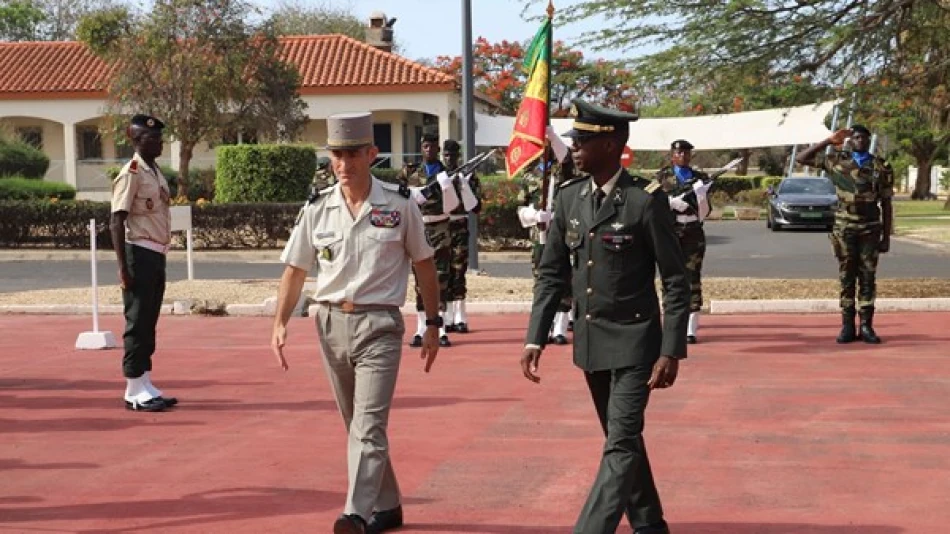
France Withdraws Military Forces from Senegal, Ending Longstanding Deployment
France Completes Military Withdrawal from Senegal as West Africa Rejects Colonial Legacy
France has handed over control of its final major military facility in Senegal, marking the end of a decades-long military presence and accelerating Paris's broader retreat from West and Central Africa. The symbolic transfer of Camp Gillet in Dakar represents another significant blow to France's traditional sphere of influence as African nations increasingly assert their sovereignty and seek new security partnerships.
The Final Handover
General Pascal Ianni, commander of French forces in Africa, ceremonially handed over the keys to the Dakar facility on Thursday during a flag-raising ceremony that saw the Senegalese national anthem played as the country's flag was hoisted over the former French base. The moment captured the shifting dynamics of Franco-African relations after more than six decades of independence.
"The handover of Camp Gillet today represents a new phase in the evolution of the partnership between our armies," Ianni told reporters. "This responds to the desire of Senegalese authorities who do not want a permanent presence of foreign forces on their territory."
Senegal's Sovereignty Push
The withdrawal stems from a clear directive by Senegalese President Bassirou Diomaye Faye, who declared last year that French military bases were incompatible with Senegalese sovereignty. This position reflects a growing continental sentiment that views permanent foreign military installations as remnants of colonial control rather than genuine security partnerships.
The two countries agreed to complete the withdrawal process by year-end, beginning in March when France transferred two other facilities in Dakar. The timeline demonstrates both nations' commitment to managing the transition smoothly while avoiding the acrimonious expulsions seen elsewhere in the region.
France's Shrinking African Footprint
Senegal's decision represents the latest domino to fall in France's collapsing security architecture across the Sahel and West Africa. Unlike the military coups and hostile ejections from Mali, Burkina Faso, and Niger, Senegal's democratic government has chosen a diplomatic path to the same destination: ending France's permanent military presence.
This distinction matters significantly for French strategy. While Paris lost influence in coup-affected nations to Russian Wagner mercenaries and anti-French sentiment, Senegal's approach preserves the possibility of future cooperation on different terms. The country remains a stable democracy with strong institutions, making its rejection of French bases particularly symbolic.
Strategic Implications for Regional Security
France's military withdrawal from Senegal eliminates a crucial logistical hub for operations across West Africa. The Dakar facilities served as a key staging ground for French interventions and a symbol of Paris's commitment to regional stability. Without this foothold, France's ability to project power quickly across the region becomes significantly constrained.
The timing coincides with escalating security challenges across the Sahel, where jihadist groups continue expanding despite years of French military intervention. Senegal's decision suggests that even stable allies question whether French military presence provides genuine security benefits or merely serves French interests.
The New Partnership Model
As its military footprint shrinks, France claims it will focus on training, intelligence sharing, and responding to specific requests for assistance. This represents a fundamental shift from the paternalistic "Françafrique" model toward what Paris hopes will be more acceptable forms of cooperation.
However, the effectiveness of this approach remains questionable. African nations increasingly prefer diversified security partnerships, working with multiple international partners including the United States, European Union, and even China for different aspects of their security needs. France's historical dominance in these relationships appears irreversibly weakened.
Broader Continental Trends
Senegal's move reflects a broader African awakening regarding sovereignty and self-determination. From Ethiopia's rejection of Western intervention to South Africa's independent foreign policy stance, African nations are asserting greater autonomy in their international relationships. This trend transcends individual governments and represents a generational shift in how African leaders view their relationship with former colonial powers.
The withdrawal also highlights the limits of traditional security partnerships in addressing contemporary challenges. Despite decades of French military presence, the Sahel region has become increasingly unstable, suggesting that external military solutions may be insufficient for addressing underlying governance and development challenges.
Most Viewed News

 Layla Al Mansoori
Layla Al Mansoori






